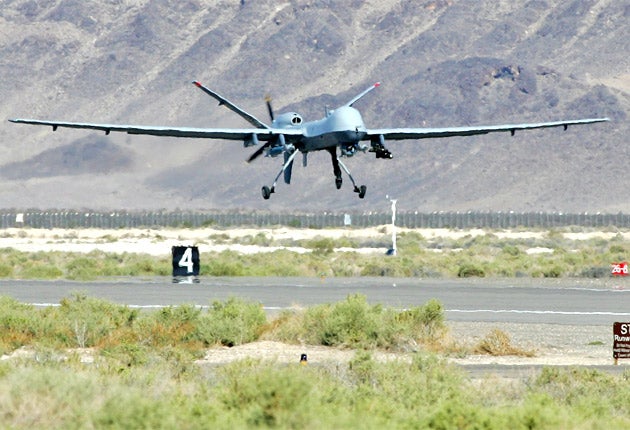US to expand drone hits with secret new bases
'Ring of steel' around terror groups revealed in leaked cables

Your support helps us to tell the story
From reproductive rights to climate change to Big Tech, The Independent is on the ground when the story is developing. Whether it's investigating the financials of Elon Musk's pro-Trump PAC or producing our latest documentary, 'The A Word', which shines a light on the American women fighting for reproductive rights, we know how important it is to parse out the facts from the messaging.
At such a critical moment in US history, we need reporters on the ground. Your donation allows us to keep sending journalists to speak to both sides of the story.
The Independent is trusted by Americans across the entire political spectrum. And unlike many other quality news outlets, we choose not to lock Americans out of our reporting and analysis with paywalls. We believe quality journalism should be available to everyone, paid for by those who can afford it.
Your support makes all the difference.The US is building a ring of secret military bases in the Horn of Africa and the Arabian peninsula as it steps up the use of unmanned drone aircraft to strike at groups linked to al-Qa'ida.
Click HERE to view graphic (107k jpg)
A base has been built on the Indian Ocean island chain of the Seychelles, according to leaked diplomatic cables. Another is being established in Ethiopia, The Washington Post reported.
The US has been launching assassination missions in Somalia targeting the Islamic militant group al-Shabaab, which publicly supports al-Qa'ida, for some time. Washington already has a base in neighbouring Djibouti. Drones were used in two days of attacks near the Shabaab-controlled port city of Kismayo in southern Somalia last week. Unconfirmed reports suggest that up to 26 people were killed.
The new bases are part of a ramping up of the counter-terrorism campaign in Yemen and Somalia and there are claims that another secret base is under construction in an unnamed country in the Arabian peninsula.
"Ocean Look" – the US operation on the Seychelles – had been billed as an anti-piracy venture, with local media invited to an open day to see one of the drones. However, secret discussions between the Seychelles government and US officials, revealed in diplomatic cables released to the WikiLeaks website, show that the drones were also intended for counter-terror operations.
At one meeting, the Seychelles President James Michel invited Washington to see the archipelago as "an aircraft carrier in the middle of the Indian Ocean without the planes" and joked that the US should move its continental headquarters, Afri-Command, there. The cables say both sides "stressed the sensitive nature of this counter-terrorism mission" and pledged not to discuss it outside the highest government circles.
When the subject of using the drones as an "offensive weapon" was brought up the US was told that Mr Michel was not "philosophically opposed" but insisted that any such move be discussed with him only. So-called "hunter killer" drones, or unmanned aerial vehicles (UAVs), have become a mainstay of US operations in Afghanistan and Pakistan's border areas but while there is blanket congressional approval for their use in these countries the new campaign is aimed at suspected groups in Yemen and Somalia.
The Ethiopian embassy in London did not respond to queries from The Independent concerning claims of a US drone base on its soil. The government in Addis Ababa has been a staunch ally in Washington's counter-terror operations and in return has dodged criticism for political oppression and human rights abuses at home. The alleged presence of a US base on Ethiopian soil would further strengthen the Addis government's position, said Roger Middleton, a regional analyst with the Chatham House think-tank, and reinforce the controversial US policy of containment of the Somali crisis.
"There is a danger that a war prosecuted in Somalia exclusively with drones will disengage the US from finding a political solution," he said. "If you can control the threat that way, you have no incentive to build a sustainable solution."
Join our commenting forum
Join thought-provoking conversations, follow other Independent readers and see their replies
Comments